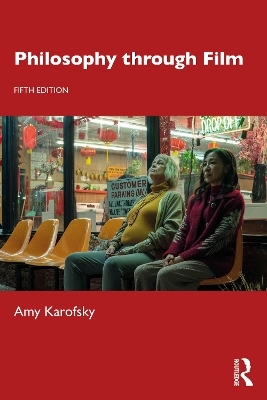
Philosophy through Film
Routledge (Verlag)
978-1-032-54459-5 (ISBN)
- Noch nicht erschienen (ca. März 2025)
- Versandkostenfrei innerhalb Deutschlands
- Auch auf Rechnung
- Verfügbarkeit in der Filiale vor Ort prüfen
- Artikel merken
Philosophy through Film, Fifth Edition uses recently released, well-received movies to explore answers to classic questions in philosophy in an approachable yet philosophically rigorous manner. Author Amy Karofsky uses one or more films in each chapter to examine one longstanding philosophical question and assess some of the best solutions to it that have been offered. The chosen movies are not mere “add-ons” to an otherwise straightforward introductory text; instead, they are fully integrated into the discussion of the issues and the various positions. And a website www.xxxxxxx includes Story Lines of Films by Elapsed Time for each focus film, allowing students to quickly search and navigate all discussed movies. Finally, each chapter includes discussion questions, an annotated list of films related to the chapter topic, and two or three historically significant primary sources (which are collected together at the end of the book).
Revised and expanded, changes to the Fifth Edition include:
The replacement of older movies with four new focus films: Anatomy of a Fall, Everything Everywhere All at Once, Get Out, and The Time Traveler’s Wife.
The addition of new primary readings from Roderick Chisholm, Jerry Fodor, Baron D’Holbach, and Susan Wolf
Important new sections added to Chapter 1 on Truth (“The Identity Theory of Truth”) and Chapter 5 on Artificial Intelligence (“The I in AI”)
A major overhaul of Chapter 6 on Free Will, Determinism, and Moral Responsibility
Updated notes throughout
The films examined in depth are: Ad Astra; Anatomy of a Fall; Arrival; Beautiful Boy; Crimes and Misdemeanors; Divergent; Everywhere Everything All at Once; Ex Machina; Equilibrium; Get Out; Gone Baby Gone; Her; Inception; Live, Die, Repeat: Edge of Tomorrow; The Matrix; Memento; A Serious Man; Silence; The Time Traveler’s Wife
Amy Karofsky is Professor of Philosophy at Hofstra University. She is the author of A Case for Necessitarianism (Routledge, 2022).
For a collection of Story Lines of the Discussed Films by Elapsed Time and other instructor-related material, instructors may visit: www.routledge.XXXXXXX .
Cover image: scene from Everything Everywhere All at Once (2022).
Amy Karofsky is Professor of Philosophy at Hofstra University. She is the author of A Case for Necessitarianism (Routledge, 2022).
Introduction 1. Truth (Arrival; Anatomy of a Fall) 2. Skepticism (The Matrix; Inception) 3. Personal Identity (Memento; The Time Traveler’s Wife) 4. The Mind-Body Problem (Get Out; Live, Die, Repeat: Edge of Tomorrow) 5. Artificial Intelligence (Her; Ex Machina) 6. Free Will, Determinism, and Moral Responsibility (Everything Everywhere All at Once; Beautiful Boy) 7. Ethics (Crimes and Misdemeanors; Gone Baby Gone) 8. Political Philosophy (Equilibrium; Divergent) 9. Philosophy of Religion (A Serious Man; Silence) 10. The Meaning of Life (Everything Everywhere All at Once; Ad Astra). Notes Readings from Primary Sources Index
| Erscheint lt. Verlag | 31.3.2025 |
|---|---|
| Zusatzinfo | 1 Tables, black and white; 2 Line drawings, black and white; 2 Illustrations, black and white |
| Verlagsort | London |
| Sprache | englisch |
| Maße | 152 x 229 mm |
| Gewicht | 453 g |
| Themenwelt | Geisteswissenschaften ► Philosophie ► Erkenntnistheorie / Wissenschaftstheorie |
| Sozialwissenschaften ► Kommunikation / Medien ► Medienwissenschaft | |
| ISBN-10 | 1-032-54459-7 / 1032544597 |
| ISBN-13 | 978-1-032-54459-5 / 9781032544595 |
| Zustand | Neuware |
| Informationen gemäß Produktsicherheitsverordnung (GPSR) | |
| Haben Sie eine Frage zum Produkt? |
aus dem Bereich

![Was heißt Denken?. Vorlesung Wintersemester 1951/52. [Was bedeutet das alles?] - Martin Heidegger](/media/113619842)
